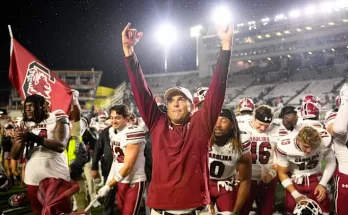Alabama’s Four-Year Title Drought: Why the Crimson Tide Haven’t Won Since 2020 and When It Could End
It sounds almost strange to say out loud—Alabama football, the gold standard of college football dominance, hasn’t won a national championship since 2020. For most programs, going four seasons without a title would barely register as a drought. But for the Crimson Tide, where winning is an expectation and championships are a tradition, this feels like an eternity. The question on every fan’s mind is why? What changed after 2020, and more importantly, what will it take to restore Alabama to its rightful place atop the college football world?
To understand where Alabama stands now, we need to revisit the last time they climbed the mountain. The 2020 team wasn’t just good—it was legendary. Led by stars like Mac Jones, DeVonta Smith, and Najee Harris, that squad was an offensive juggernaut, setting records while rolling through an SEC-only schedule during a pandemic season that tested every program’s resilience. They capped it off with a dominating win over Ohio State in the national championship game, marking Nick Saban’s seventh title and further cementing Alabama as the dynasty of the modern era.
But dynasties, even the strongest, face challenges. Since 2020, college football has changed dramatically. The transfer portal exploded, name, image, and likeness (NIL) deals shifted recruiting dynamics, and roster management became more complex than ever. Alabama, while still elite, faced growing parity as more programs began leveraging these tools to close the gap. Schools like Georgia seized the moment, building rosters with depth and talent that rivaled even the Crimson Tide. Kirby Smart, a former Saban assistant, took Georgia to back-to-back national titles in 2021 and 2022, creating a new power center in the SEC and knocking Alabama from its perch as the unquestioned king.
Add to that the rise of programs like Michigan, Ohio State’s continued strength, and now even Washington and Texas entering the national conversation, and it’s clear the competition is fiercer than ever. For Alabama, the margin for error has never been smaller. Recruiting remains strong, but it’s no longer a one-horse race. Other programs have built the kind of infrastructure and financial backing through NIL that once seemed impossible outside Tuscaloosa.
Then came the biggest change of all—Nick Saban stepping down after the 2023 season. For nearly two decades, Saban was Alabama football. His meticulous attention to detail, relentless pursuit of excellence, and unmatched recruiting prowess created the dynasty that dominated the sport. Losing a figure of that magnitude isn’t something any program can absorb overnight. Enter Kalen DeBoer, the offensive mastermind who took Washington to the national championship game and quickly became one of the most respected coaches in college football. His hiring signaled Alabama’s commitment to staying at the top, but it also ushered in a period of transition that fans aren’t used to seeing.
DeBoer inherits immense talent, but also immense pressure. Alabama fans don’t want patience—they want titles. Can he deliver? Early signs point to a coach who understands the assignment. DeBoer has embraced recruiting in the NIL era, retained key staff members, and looks poised to bring his innovative offensive system to a roster filled with speed and power. His challenge will be balancing that offensive firepower with the defensive toughness that defines SEC football. If Alabama can restore its dominance in the trenches and pair it with DeBoer’s dynamic scheme, another national title could be closer than people think.
The biggest question heading into 2025 is whether Alabama can regain the consistency that made it unbeatable in big games. Close losses in recent seasons—to Georgia, LSU, and even a few non-conference struggles—have fueled critics who claim the Tide’s dynasty is over. But history suggests writing off Alabama is a mistake. Every time the dynasty has appeared to wobble, it has roared back stronger than ever. This program isn’t built on hype—it’s built on a standard, one that players, coaches, and fans refuse to compromise.
Still, four seasons without a championship feels like a lifetime in Tuscaloosa. Georgia has claimed the SEC spotlight, and Michigan finally broke through for a title in 2023. The playoff field is expanding to 12 teams in 2025, giving Alabama more paths to a championship but also more potential obstacles. The road ahead will be brutal, but for Alabama, that’s nothing new. The question isn’t whether they’ll compete—it’s whether they can finish.
As we look toward the new season, one thing is certain: the hunger in Tuscaloosa is real. A fan base that measures success in rings won’t settle for moral victories or near-misses. Kalen DeBoer knows that. His players know that. The college football world knows that. And if Alabama can answer the lingering questions about defense, adapt to the new era of roster building, and keep its identity intact, the drought might end sooner than critics expect. Until then, the countdown continues. The last title came in 2020. The next one? Alabama believes it’s coming, and when it does, the college football landscape will feel the impact all over again.



